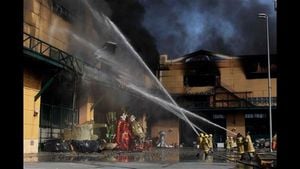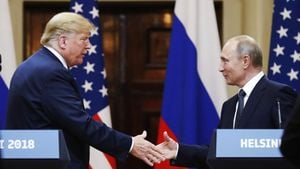High-profile visits to the White House have become increasingly complex due to political influences. From world leaders to championship teams, the nature of these visits signifies not just traditions but the intertwining of sports and politics.
India’s Prime Minister Narendra Modi is making his visit to Washington D.C. with the goal of strengthening ties with President Donald Trump. Scheduled for Thursday, Modi’s meeting with the U.S. president is colored by the backdrop of trade and immigration issues, which have increasingly become points of contention. Since Trump's return to office, Modi has been clear about addressing these concerns to preserve the growing U.S.-India relationship.
According to The New York Times, Modi aims to ease tensions by presenting offerings on trade, particularly focusing on increasing energy supplies from America, including liquefied natural gas. Indian officials have disclosed talks surrounding expanded cooperation on U.S. defense equipment as well.
Importantly, Modi's government is letting it be known it will cooperate with Trump’s stance on deportations, as India is home to the largest group of undocumented migrants outside of Latin America. This cooperation, highlighted by the arrival of Indian nationals deported from the U.S. just before Modi's trip, was aimed at mitigating political backlash and easing potential friction.
Modi’s visit marks him as the fourth world leader to visit Trump since he began his second term, following leaders of Japan, Israel, and Jordan. The relationship between India and the U.S. has been framed against the backdrop of shared geopolitical interests, particularly concerning China's rising assertiveness. Amidst these developments, Vikram Misri, India's foreign secretary, emphasized the importance of defense cooperation and technology exchange between the two nations.
On the sports front, the recent Super Bowl champions, the Philadelphia Eagles, face their own political conundrum. Traditionally, after winning the NFL championship, teams would visit the sitting president, but this presumption is no longer straightforward. Eagles offensive lineman Lane Johnson recently stated, "I’d be honored to go, regardless of who the president is, but we’ll see. It’s up to the team," reflecting the cautious approach the team is taking with the decision. With Trump back at the helm, the stakes of such visits have transformed dramatically.
The Eagles were not the only ones affected during Trump's previous term, where championship visits saw increased scrutiny and divisions. During his first term, only one out of four Super Bowl winners made the trip to the White House. Factors such as Trump's public criticism of NFL players who protested during the national anthem contributed to the controversy surrounding visits, leading to increased divisions even within teams.
Guridy, noted historian and author, suggests the political climate today has made every decision heavily laden with potential interpretations. He asserts, "The politics of today are so polarized... whatever you do, you’re going to be perceived to be supporting a political platform or position." This sentiment resonates as teams reconsider the long-standing tradition of White House visits, viewing them through the lens of their political values.
Tom Knecht, political science professor, explains the role sports have played historically for presidents - as moments to unify the nation rather than deepen divides. Now, Trump seems to have altered this norm, utilizing sports as political tools rather than avenues for unity. This shift poses challenges for teams, especially those with players holding differing political values.
Reflecting on the potential future, Knecht raises uncertainty about the tradition of visits to the White House. He asserts, "It’s a double-edged sword. How many times do you get to go visit the White House? But also, you have your own political values to think of." This highlights the dilemma faced by modern championship teams as they navigate the charged political atmosphere.
What is uncertain is how these changes will influence the future of such ceremonial visits. Guridy points out, “Maybe the White House visit continues, but it either peters out because it becomes too politically problematic for the president, or certain leagues align themselves with the administration and others won’t.” The political climate is more polarized than ever, continuing to alter how sports teams relate to the presidency, leaving many questions about the future of high-profile visits to the White House unresolved.



